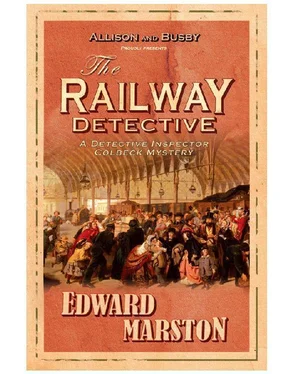Edward Marston - The Railway Detective
Здесь есть возможность читать онлайн «Edward Marston - The Railway Detective» весь текст электронной книги совершенно бесплатно (целиком полную версию без сокращений). В некоторых случаях можно слушать аудио, скачать через торрент в формате fb2 и присутствует краткое содержание. Жанр: Классический детектив, Исторический детектив, на английском языке. Описание произведения, (предисловие) а так же отзывы посетителей доступны на портале библиотеки ЛибКат.
- Название:The Railway Detective
- Автор:
- Жанр:
- Год:неизвестен
- ISBN:нет данных
- Рейтинг книги:4 / 5. Голосов: 1
-
Избранное:Добавить в избранное
- Отзывы:
-
Ваша оценка:
- 80
- 1
- 2
- 3
- 4
- 5
The Railway Detective: краткое содержание, описание и аннотация
Предлагаем к чтению аннотацию, описание, краткое содержание или предисловие (зависит от того, что написал сам автор книги «The Railway Detective»). Если вы не нашли необходимую информацию о книге — напишите в комментариях, мы постараемся отыскать её.
The Railway Detective — читать онлайн бесплатно полную книгу (весь текст) целиком
Ниже представлен текст книги, разбитый по страницам. Система сохранения места последней прочитанной страницы, позволяет с удобством читать онлайн бесплатно книгу «The Railway Detective», без необходимости каждый раз заново искать на чём Вы остановились. Поставьте закладку, и сможете в любой момент перейти на страницу, на которой закончили чтение.
Интервал:
Закладка:
Faces swam in front of him then one of them swooped in close. He felt a kiss on his cheek and his hand was squeezed very gently. A soft female voice caressed his ear.
‘Hello, Father,’ said Madeleine Andrews. ‘I’m here with you.’
Victor Leeming was weary. After conducting a long and taxing series of interviews at the offices of the London and North Western Railway Company, he was grateful that his duties were almost over for the day. All that he had to do was to repair to Colbeck’s house in order to compare notes with the Inspector. He hoped that the latter had had a more productive evening than he had managed.
As a cab took him to the house in John Islip Street, he listened to the clacking of the horse’s hooves on the hard surface and mused on the seductive simplicity of a cab driver’s life. Ferrying passengers to and fro across London was an interesting, practical and undemanding way of life, free from the dangers of police work or from the tedium that often accompanied it. One could even count on generous tips, something that was unheard of among those who toiled at Scotland Yard. By the time he reached his destination, Leeming had come to envy the virtues of a less onerous occupation.
Once inside the house, however, he dismissed such thoughts from his mind. Robert Colbeck had a warm welcome and a bottle of Scotch whisky waiting for him. The two men sat down in a study that was lined with books on all manner of subjects. Neat piles of newspapers and magazines stood on a beautiful mahogany cabinet. Framed silhouettes occupied most of the mantelpiece. Above them, on the wall, in a large, rectangular gilt frame, was a portrait of a handsome middle-aged woman.
‘How did you fare?’ asked Colbeck, sipping his drink.
‘Not very well, Inspector.’
‘Did the railway company close ranks on you?’
‘That’s what it amounted to,’ said Leeming, taking a first, much-needed taste of whisky. ‘They denied that any of their employees could have leaked information to the robbers and boasted about their record of carrying money safely by rail. I spoke to four different people and each one told me the same thing. We must search elsewhere.’
‘We’ll certainly do that, Victor, but I still think that we should take a closer look at the way the company operates its mail trains. We’ve already exposed the shortcomings of railway policemen.’
‘They were rather upset when I told them about that.’
‘Understandably.’
‘Though not as irate as Inspector McTurk,’ recalled Leeming with a broad grin. ‘He was in a frenzy. McTurk was such a bad advertisement for Scotland.’ He raised his glass. ‘Unlike this excellent malt whisky.’
‘Yes,’ said Colbeck with amusement. ‘The good Inspector was not the most prepossessing individual, was he? But I’m sorry that you found the railway company itself in an uncooperative mood. I had a much more profitable time at the home of William Ings.’
‘What sort of man is he?’
‘An absent one.’
Colbeck told him in detail about the visit to Maud Ings and how his request for the house to be watched had been summarily turned down. Leeming rolled his eyes.
‘If only Superintendent Tallis was on our side for once.’
‘Now, now, Victor,’ said Colbeck with mock reproof. ‘Do I hear a murmur of insubordination?’
‘He’s supposed to put handcuffs on the villains, not on us.’
‘He does hamper us now and then, I agree, but we must contrive to work around him. One of the things I want you to do in the morning is to find out who patrols the beat that includes the house. Ask the officers in question to keep an eye out for Mr Ings.’
‘Yes, Inspector. What else am I to do tomorrow?’
‘Report to Superintendent Tallis first thing,’ said Colbeck. ‘He wishes to know exactly what you found out at the offices of the London and North Western Railway Company.’
‘Precious little.’
‘That’s rather perplexing, I must say. People with nothing to hide are usually more open and helpful.’
‘They were neither.’
‘Then we must find out why. When you’ve delivered your report, I want you to go to the Royal Mint to see if there was any breach of security there. I fancy there are more names to unearth than that of William Ings.’
‘What if he doesn’t make the mistake of returning to his house?’
‘We’ll have to go looking for him.’
‘In the Devil’s Acre?’ asked Leeming with disbelief. ‘You’d be searching for a needle in a haystack. Besides, we couldn’t venture in there without a dozen or more uniformed constables at our back.’
‘Oh,’ said Colbeck, casually, ‘that won’t be necessary.’
He finished his drink and put his glass on the mahogany desk. He looked at ease in the elegant surroundings. Leeming was making a rare visit to the house and he felt privileged to be there. Colbeck was a private man who invited few colleagues to his home. It was so much larger and more comfortable than the one in which Leeming and his family lived. He gazed at the well-stocked shelves.
‘Have you read all these books, Inspector?’ he asked.
‘Most of them,’ replied the other. ‘And the ones I haven’t read, I’ve probably referred to. A good library is an asset for a detective. If you’re interested, I have a few books here on the development of the steam locomotive.’
‘No, thank you. I barely have time to read a newspaper.’
‘That’s a pity.’
‘There’s no such thing as leisure when you have a family.’
‘I’ll take your word for it, Victor.’
Leeming admired the mahogany cabinet beside him. ‘My wife would covet some of this lovely furniture,’ he said, stroking the wood.
‘It’s not for sale, I fear,’ warned Colbeck with a fond smile. ‘I inherited it with the house. My father was a cabinetmaker. Most of the things in here are examples of his handiwork.’
‘He must have been a fine craftsman.’
‘He was, Victor, but he never wanted his son to follow in his footsteps. My father had boundless faith in the powers of education. That’s why I was packed off to school at such an early age.’
The clock on the desk began to strike and Leeming realised how late it was. It was time to go home. He downed the last of the whisky in one gulp then rose to his feet.
‘What will you be doing tomorrow, sir?’ he asked.
‘Going to Birmingham. I need to speak to the bank manager.’
‘Better you than me. I hate long train journeys. They unsettle my stomach. To be honest, I don’t like travelling by rail at all.’
‘Really? I love it. Believe it or not, there was a time in my youth when I toyed with the notion of being an engine driver.’
‘The life of a cab driver has more attraction for me.’
‘You prefer the horse to the steam locomotive?’
‘I do, Inspector.’
‘Then you’re behind the times, Victor,’ said Colbeck. ‘The railways are here to stay. In any race between them, a steam train will always beat a horse and carriage.’
‘That’s not what happened today, sir.’
‘What do you mean?’
‘The mail train came a poor second,’ argued Leeming. ‘It was put out of action completely while the robbers escaped overland by horse. I think that there’s a message in that.’
Colbeck pondered. ‘Thank you, Victor,’ he said at length. ‘I do believe that you’re right. There was indeed a message.’
The fight was over almost as soon as it had begun. After exchanging loud threats and colourful expletives, the two men leapt to their feet and squared up to each other. But before either of them could land a telling blow, they were grabbed by the scruff of their necks, marched to the door and thrown out into the alleyway with such force that they tumbled into accumulated filth on the ground. Rubbing his hands together, the giant Irishman who had ejected them sauntered back to the crowded bar.
Читать дальшеИнтервал:
Закладка:
Похожие книги на «The Railway Detective»
Представляем Вашему вниманию похожие книги на «The Railway Detective» списком для выбора. Мы отобрали схожую по названию и смыслу литературу в надежде предоставить читателям больше вариантов отыскать новые, интересные, ещё непрочитанные произведения.
Обсуждение, отзывы о книге «The Railway Detective» и просто собственные мнения читателей. Оставьте ваши комментарии, напишите, что Вы думаете о произведении, его смысле или главных героях. Укажите что конкретно понравилось, а что нет, и почему Вы так считаете.












